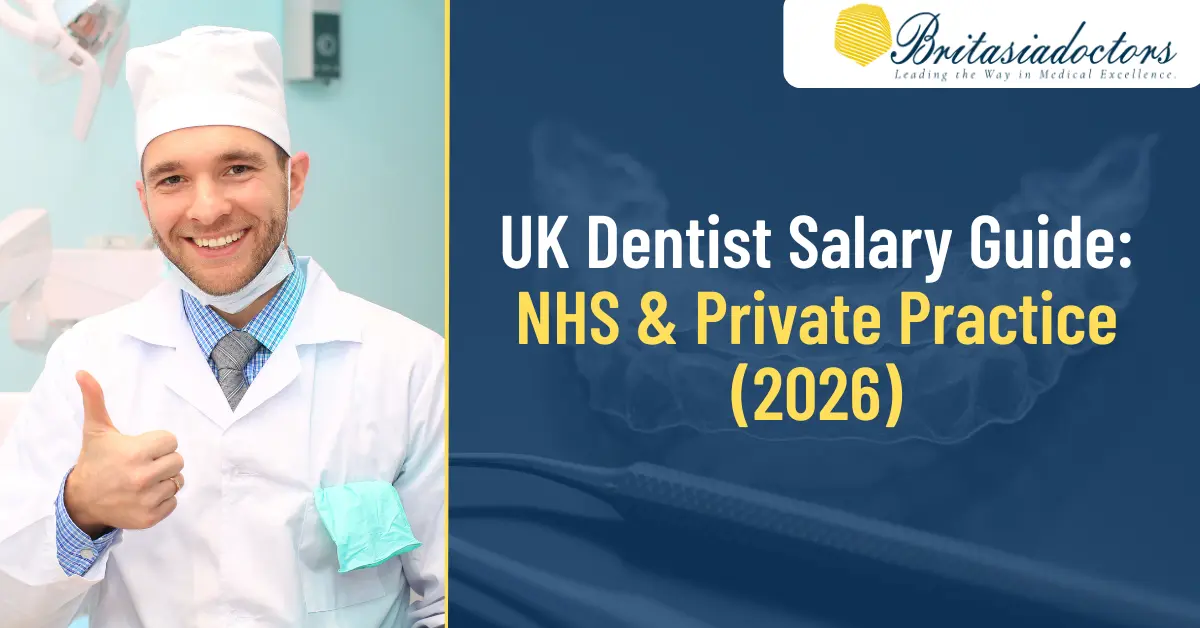
Dentistry remains one of the most respected healthcare professions in the UK, offering both financial stability and the opportunity to make a meaningful difference in patients’ lives. Whether you’re considering dentistry as a career path, looking to transition between NHS and private practice, or simply curious about dentist earnings, this comprehensive guide will explore the salary expectations and factors that influence dental professionals’ income across the UK.
Average Dentist Salary in the UK (2026)
As of 2025, dentists in the UK earn between £60,000 and £79,000 per year on average. However, this figure varies significantly based on several key factors that we’ll explore throughout this article.
NHS Dentist Salaries
The National Health Service (NHS) offers structured career progression with predictable salary increases:
Foundation Training
-
First-year NHS foundation dentists earn approximately £38,472 annually (mandatory training year).
NHS Career Progression
-
After foundation training: £47,000 - £100,000 depending on experience and responsibilities
-
Dental core trainees: £49,909 - £61,825
-
NHS dental consultants: £88,364 - £119,133
NHS Benefits
-
Structured pay scale with predictable progression
-
Generous pension scheme
-
Paid leave that increases with service length
-
Job security and protection from market fluctuations
Private Practice Dentist Salaries
Private practice often offers higher earning potential but comes with different considerations:
Private Practice Earnings
-
Average earnings: £50,000 - £100,000 annually
-
Lead dentists: £41,000 - £95,000 according to recent data
-
Dentists in high-demand areas or specialties: £130,000+
-
Top-earning specialists: £170,000 - £200,000
Additional Private Practice Income Streams
-
Selling dental products
-
Running training courses
-
Providing aesthetic services (e.g., Botox)
-
Membership- or subscription-based dental plans
Factors Affecting Dentist Salaries in the UK
1. Location
Geographic location significantly impacts earning potential:
-
London: Higher salaries to offset increased living costs
-
NHS consultants: £79,000 - £130,000
-
Private practitioners: Up to £170,000+
-
-
Other major cities: Generally higher than rural areas but lower than London
-
Rural areas: Typically lower salaries but potentially higher quality of life
2. Experience Level
Career progression substantially affects income:
-
Entry-level/Foundation: Around £38,000 annually
-
Early career (1-5 years): £50,000 - £60,000
-
Mid-career (5-10 years): £60,000 - £100,000
-
Experienced (10+ years): £100,000+ (especially in private practice)
3. Specialization
Certain dental specialties command higher salaries:
-
Oral Surgery: Among the highest-paid specialties
-
Orthodontics: Particularly lucrative in private practice
-
Cosmetic Dentistry: High earning potential in private settings
-
Implantology: Growing demand with premium fees
4. Work Environment (NHS vs. Private)
Your choice between NHS and private practice significantly impacts earning potential:
NHS Advantages
-
Structured pay scales
-
Job security
-
Pension benefits
-
Clearer work boundaries
NHS Challenges
-
Administrative burden
-
UDA (Units of Dental Activity) quotas
-
High patient volume
-
Limited earning ceiling
Private Practice Advantages
-
Higher earning potential
-
Greater control over fees
-
More flexible scheduling
-
Focus on quality over quantity
Private Practice Challenges
-
Business management responsibilities
-
Practice overhead costs
-
Dependence on reputation and patient base
-
Greater income variability
The Hybrid Approach: Balancing NHS and Private Work
Many dentists in the UK opt for a mixed approach to maximize benefits:
-
Part-time NHS, part-time private: Balancing security with higher earning potential
-
NHS practice with private options: Offering patients NHS care with private treatment upgrades
-
Private practice with NHS contracts: Maintaining some NHS work while developing a private patient base
This balanced approach allows dentists to enjoy both the stability of NHS work and the earning potential of private practice.
Career Development and Salary Growth
NHS Career Pathway
-
Foundation training (Year 1)
-
Dental core training or general dental practice
-
Specialty training (optional)
-
Consultant roles
Private Practice Progression
-
Associate dentist in established practice
-
Lead dentist or practice partner
-
Practice owner
-
Multiple practice ownership or specialist referral center
UK Dentist Salaries Compared Globally
While UK dentist salaries are competitive, they differ from other countries:
-
United States: £150,000+ annually (higher than UK)
-
Canada: £170,000+ annually (higher than UK)
-
Germany: Up to £100,000 annually (comparable to the UK)
-
Australia: £85,000 - £150,000 (comparable to or higher than the UK)
It’s important to consider cost of living, healthcare systems, and tax structures when making international comparisons.
Current Trends Affecting Dentist Salaries in the UK
NHS Dentistry Challenges
-
Workforce shortages (over 21% of positions unfilled)
-
Increasing administrative requirements
-
Ongoing contract reform discussions
Private Dentistry Growth Areas
-
Digital dentistry technologies
-
Cosmetic and aesthetic treatments
-
Dental implants and advanced restorative options
-
Subscription-based dental plans
Conclusion
Dentistry in the UK remains a financially rewarding career path, with significant differences between NHS and private practice opportunities. While NHS roles offer stability, structured progression, and benefits, private practice provides higher earning potential and greater autonomy.
Your eventual earnings will depend on your career choices, specialization, location, and ability to balance the benefits and challenges of different practice models. Many successful dentists find that a hybrid approach offers the best of both worlds.
Whether you prioritize financial rewards, work-life balance, or professional development, understanding these salary factors will help you make informed decisions about your dental career path in the UK.




